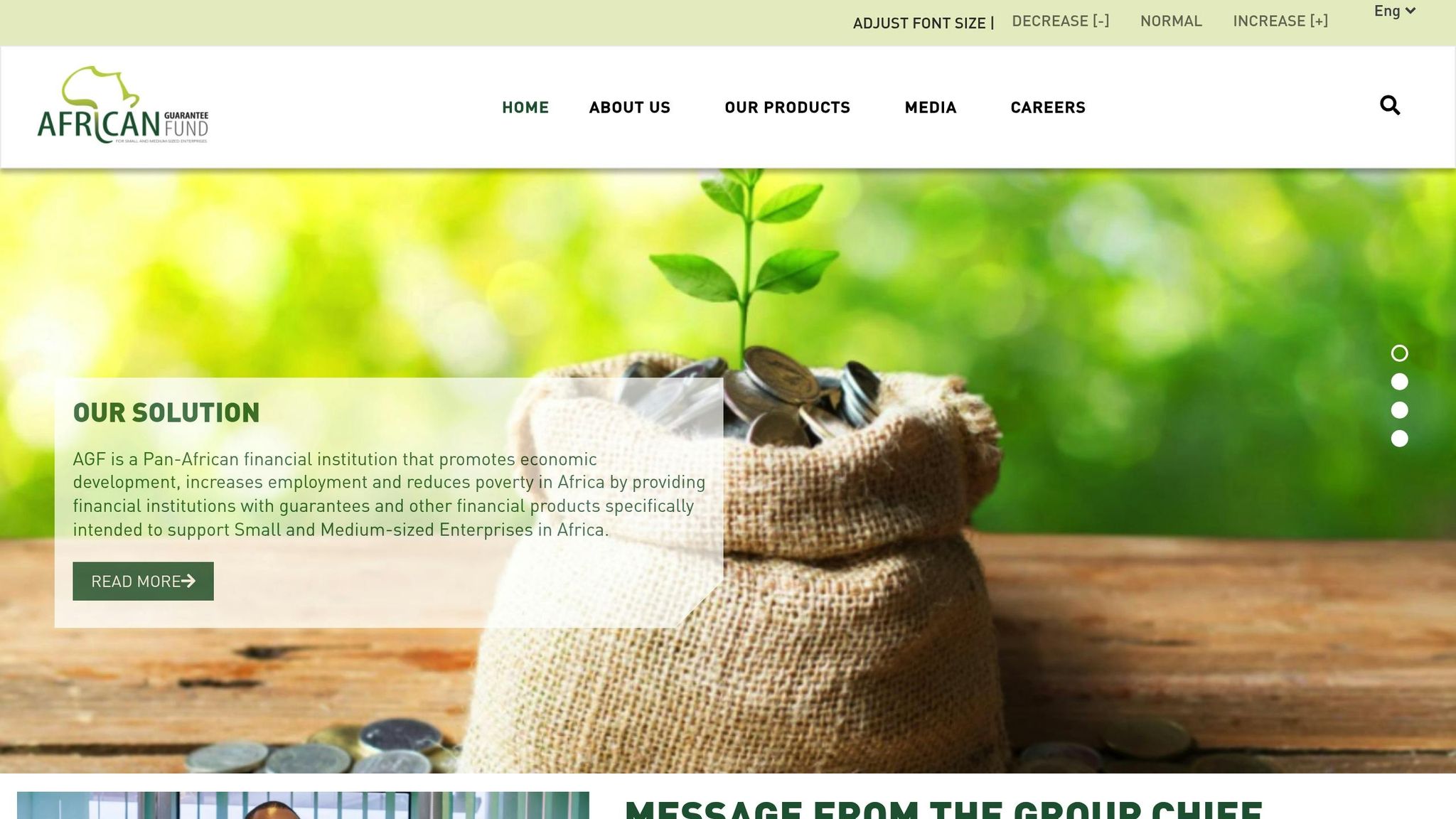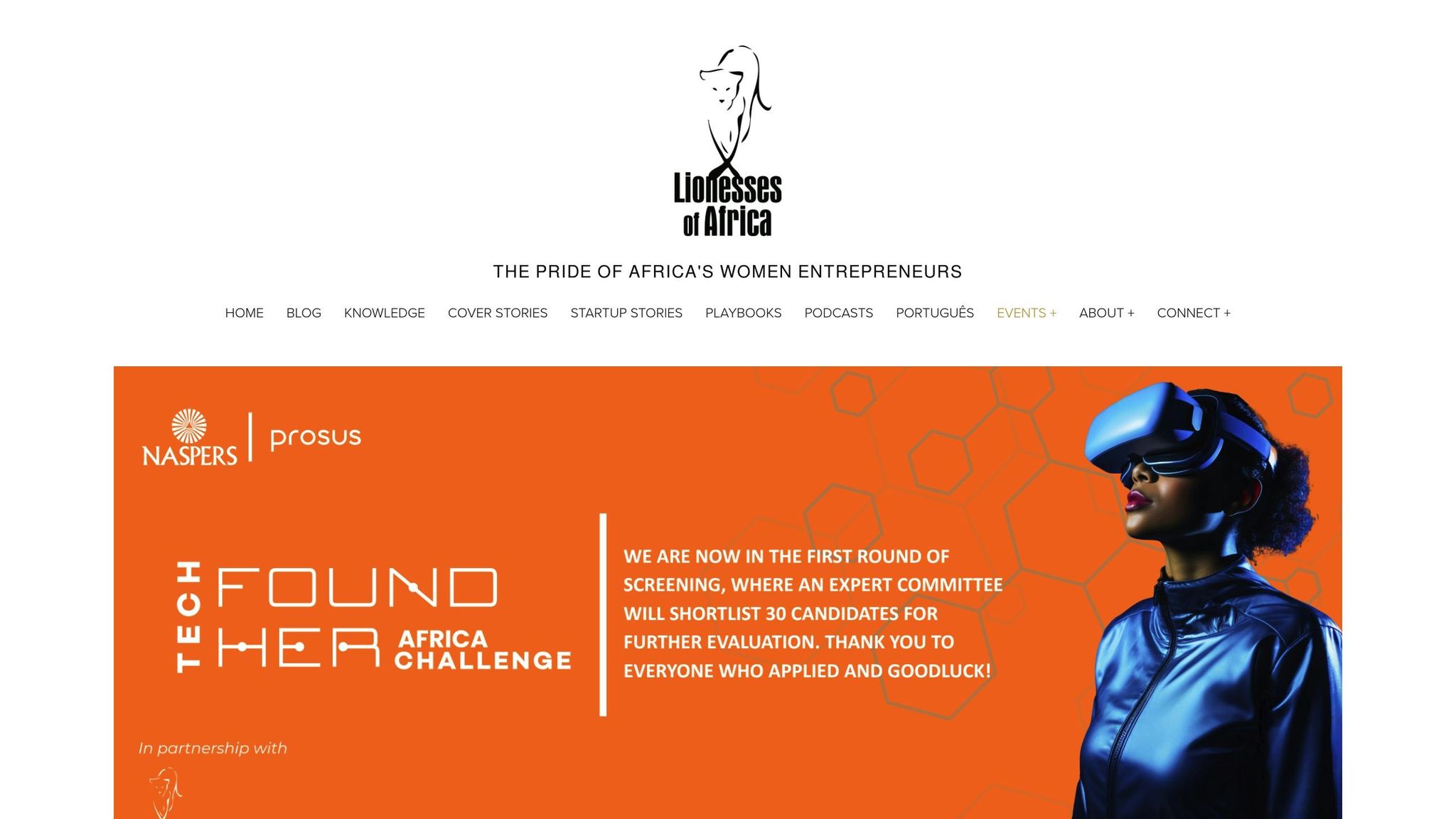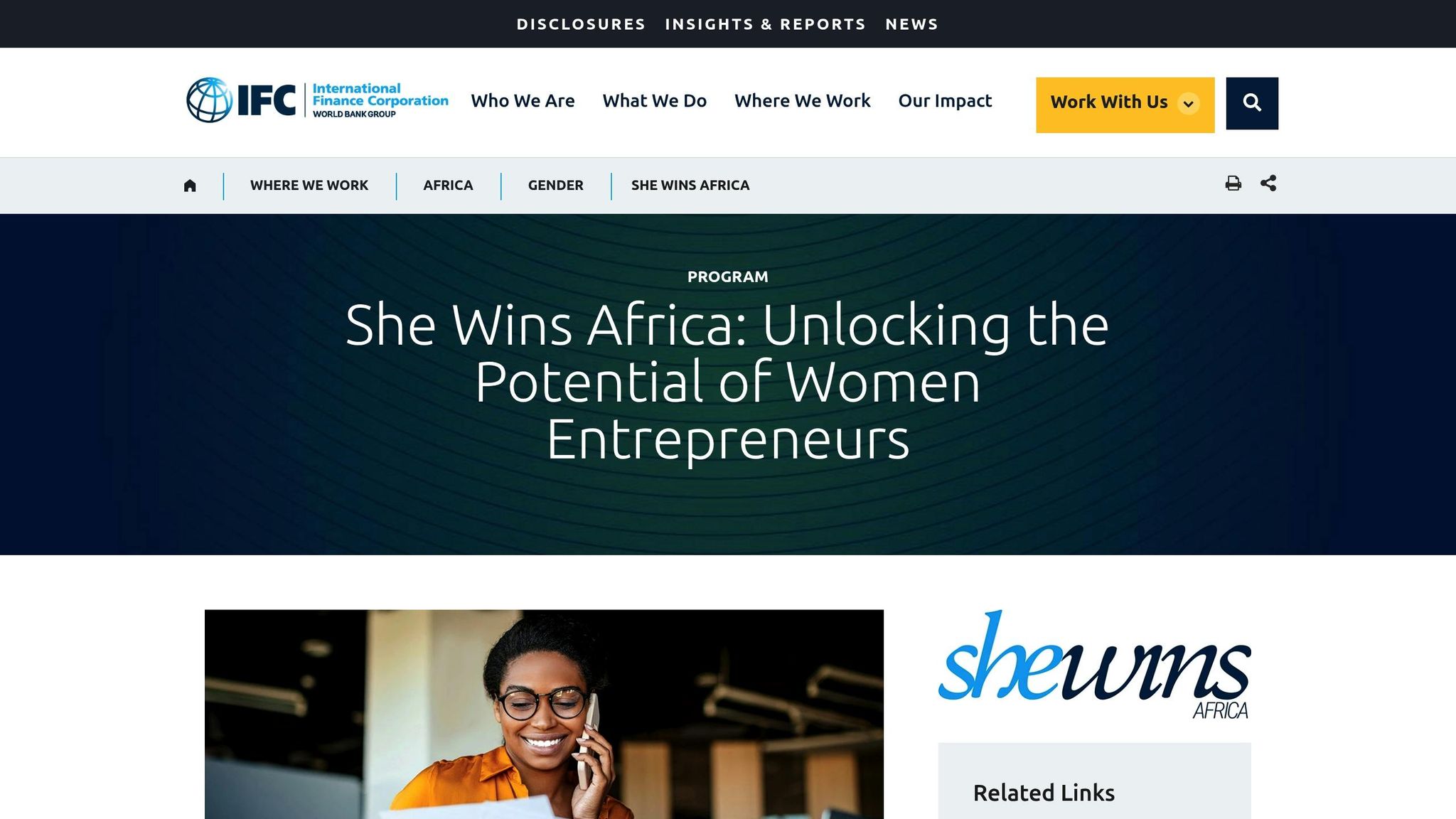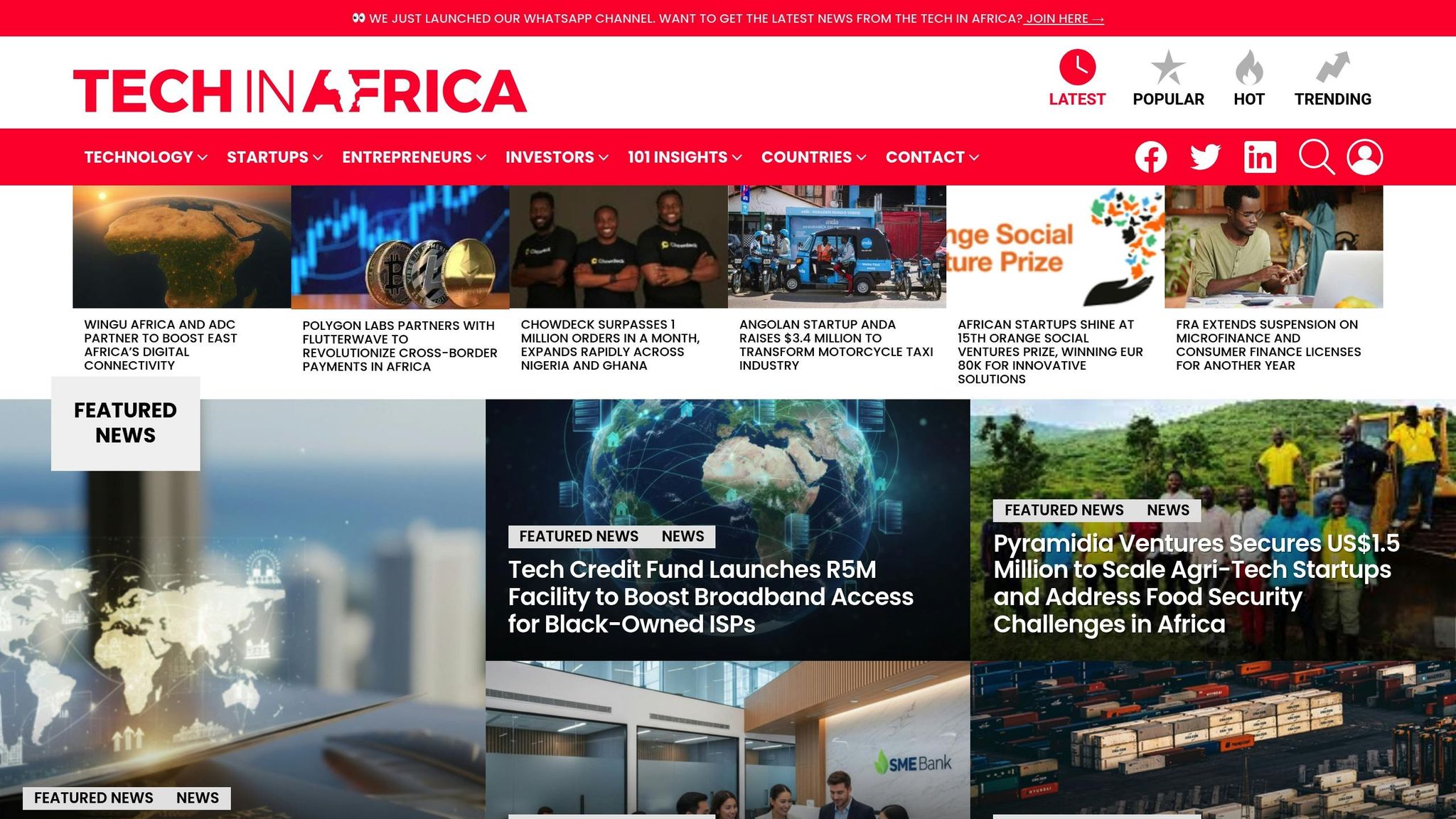Ultimate Guide to Funding for Women Entrepreneurs in Africa

African women entrepreneurs are leading in entrepreneurship globally, with 24% actively engaged in starting and running businesses. However, they face a $42 billion financing gap, limiting growth and innovation. This guide highlights key funding opportunities, barriers women face, and programs designed to support their ventures.
Key Takeaways:
- Barriers: Limited networks, gender bias, and financial literacy challenges restrict access to funding.
- Funding Programs:
- Support Beyond Funding: Programs also provide mentorship, training, and networking to help women scale their businesses.
- Sector-Specific Focus: Opportunities exist in tech, agriculture, and green economy sectors.
Quick Comparison of Funding Programs:
| Program | Funding Amount | Region | Focus | Deadline |
|---|---|---|---|---|
| 360 Woman Africa Fund | Not specified | Nigeria | Women-led businesses | Ongoing |
| Tech FoundHER Africa | $100,000 | Pan-African | Tech-enabled startups | Sep 30, 2025 |
| IYBA WE4A | $5,000–€50,000 | 8 African countries | Green-focused businesses | Jan 25, 2026 |
Women entrepreneurs in Africa can leverage these programs to overcome barriers and access resources essential for growth. This guide explores how to align with these opportunities and maximize success.

Major Grant and Funding Programs for Women in Africa
Empowering African women entrepreneurs goes beyond providing capital – it’s about opening doors to mentorship, training, and investor networks. Below are three standout programs that demonstrate this commitment to supporting women-led businesses.
360 Woman Africa Enterprise Fund Women-in-Business Grant

The 360 Woman Africa Enterprise Fund is designed to support Nigerian women entrepreneurs ready to grow their businesses. This grant focuses on women-led ventures with proven success or promising business plans that show the potential to positively impact their communities.
To apply, women entrepreneurs must operate registered businesses in Nigeria. The program seeks leaders who bring fresh ideas and a dedication to creating meaningful change locally. Applicants are expected to showcase operational experience and clear growth potential.
But it’s not just about the funding. The program also offers business development training and mentorship, equipping recipients with the tools to manage and scale their businesses effectively. This holistic approach makes it especially beneficial for entrepreneurs transitioning from startups to more established ventures.
Tech FoundHER Africa Challenge

For women in the tech space, the Tech FoundHER Africa Challenge provides $100,000 grants to tech-enabled startups. To date, this initiative has trained over 1,100 women in investor readiness and impacted millions.
This program is open to women-led, tech-enabled startups across Africa, with eligibility extending to businesses up to the Series B growth stage. Applicants must demonstrate market validation and revenue generation, making it perfect for startups that have moved beyond the idea phase and are already generating income.
The challenge prioritizes scalable, tech-driven solutions that address real-world issues. The application process includes submitting a detailed business plan, showcasing innovative technology, and providing proof of market demand. Finalists go through interviews and pitch sessions as part of the selection process.
Beyond the financial grant, participants gain access to mentorship, business resources, and investor networks, which can be just as transformative as the funding. By preparing entrepreneurs for future funding rounds, the program helps tackle challenges like gender bias and limited access to networks, which often hinder women in tech.
Women Entrepreneurship for Africa (IYBA WE4A) Programme
The Women Entrepreneurship for Africa Programme offers tiered funding, ranging from $5,000 seed capital to €50,000 for high-growth ventures. Backed by the Tony Elumelu Foundation, which has supported over 21,000 entrepreneurs and 2.5 million young Africans since 2010, this program is a significant resource for women entrepreneurs.
This initiative focuses on green and sustainable businesses, reflecting the increasing importance of environmentally responsible entrepreneurship. Women from countries like Cameroon, Kenya, Malawi, Mozambique, Senegal, Tanzania, Togo, and Uganda can apply during the window from October 6, 2025, to January 25, 2026.
To qualify, applicants must have a working product and initial customer traction. The selection process prioritizes innovation, sustainability, and social/environmental impact, alongside strong leadership and business longevity.
The program includes an evaluation phase from February to March 2026, with the official launch in April 2026. This structured timeline ensures participants receive tailored support. Selected entrepreneurs benefit from mentorship, training, and networking opportunities, alongside financial assistance. Among the participants, 120 entrepreneurs receive €10,000 grants, while 15 high-growth businesses are awarded up to €50,000 and participate in an intensive growth acceleration program.
| Program | Funding Amount | Geographic Focus | Key Requirements | Application Deadline |
|---|---|---|---|---|
| 360 Woman Africa Enterprise Fund | Not specified | Nigeria | Registered business, proven track record | Ongoing |
| Tech FoundHER Africa Challenge | $100,000 | Pan-African | Tech-enabled, revenue-generating, up to Series B | September 30, 2025 |
| IYBA WE4A Programme | $5,000–€50,000 | 8 African countries | Working product, existing customers, green focus | January 25, 2026 |
These programs illustrate the growing support ecosystem for women entrepreneurs across Africa. Each offers unique benefits tailored to specific industries, business stages, and regions. The key is identifying the program that aligns best with your goals and business vision.
Investment and Accelerator Programs for Women Entrepreneurs
Grants may offer crucial funding, but investment and accelerator programs go a step further by equipping women entrepreneurs with the skills, networks, and investor connections needed to grow their businesses. These programs focus on building a foundation for long-term growth through strategic investment readiness, complementing direct financial support. Initiatives like She Wins Africa and other key accelerators are leading the charge in creating these opportunities.
She Wins Africa

She Wins Africa, backed by the International Finance Corporation (IFC), tackles the challenges women entrepreneurs face in accessing investment capital. These challenges include limited startup funding, underdeveloped support networks, and a lack of gender-focused investing knowledge among venture capital firms. The program offers investment readiness training, business development skills, and helps venture capital firms build expertise in gender-lens investing. It also organizes matchmaking and pitching events, connecting female founders directly with investors – offering a clear pathway to secure funding. Though applications for the first cohort have closed, the announcement of the selected “SheWinners” is eagerly anticipated.
Key Accelerator and Venture Capital Programs
Beyond broad initiatives, targeted accelerator programs are reshaping the funding landscape for women entrepreneurs. These programs complement earlier grants by creating a robust support system that combines funding with mentorship and networking.
One standout example is the Tony Elumelu Foundation, a well-established leader in this space. Since its inception in 2010, the foundation has empowered over 21,000 entrepreneurs and engaged more than 2.5 million young Africans through its digital platform, TEFConnect. The foundation has pledged $100 million to identify, train, mentor, and fund 10,000 African entrepreneurs by 2025. TEFConnect offers more than just funding – it provides access to critical networks, resources, and continuous support.
Sector-specific accelerators are also gaining traction by addressing unique market needs. For instance, the Mastercard Foundation Agribusiness Fund focuses on women in agricultural technology, acknowledging their pivotal role in Africa’s agriculture sector. These programs deliver tailored mentorship, connect participants to industry supply chains, and provide funding aligned with the specific demands of their sectors.
Additionally, virtual acceleration programs have become increasingly popular. By combining online training modules with virtual mentorship and digital networking, these programs ensure high-quality support is available to entrepreneurs regardless of their location.
| Program Type | Key Benefits | Focus Areas | Typical Duration |
|---|---|---|---|
| Investment Readiness Training | Pitch skills, financial modeling, and investor relations | All sectors | 3–6 months |
| Sector-Specific Accelerators | Industry connections, specialized mentorship | Agritech, fintech, healthtech | 6–12 months |
| Virtual Acceleration | Remote access, flexible scheduling, global networks | Tech-enabled businesses | 3–9 months |
These programs highlight that women entrepreneurs need more than just financial support. They require ecosystems that combine funding with essential skills, mentorship, and access to investor networks. To succeed, entrepreneurs must showcase clear market opportunities, growth potential, and a proven product.
Regional and Sector-Specific Funding Opportunities
Funding opportunities across Africa vary widely depending on the region and industry focus, allowing programs to better meet specific needs and priorities.
Regional Funding Opportunities
West Africa stands out with some of the continent’s most developed funding ecosystems. Nigeria, in particular, has both government-backed and private initiatives aimed at supporting women-led businesses. The country’s booming tech industry has opened doors for female entrepreneurs in areas like fintech, e-commerce, and digital services.
East Africa benefits from a strong culture of cross-border collaboration. Programs in this region often provide seed funding and comprehensive training to women entrepreneurs operating across multiple countries, fostering growth and innovation.
Southern Africa prioritizes funding for green businesses and tech startups, reflecting a focus on sustainability and climate-conscious entrepreneurship. Many initiatives also promote cross-border trade, giving women entrepreneurs the tools to expand their businesses beyond local markets.
Most regional programs come with specific requirements, such as business registration in the target area, a woman founder, and proof of viability – often demonstrated through revenue generation or market traction. With these regional distinctions in mind, let’s explore industry-specific funding opportunities.
Sector-Specific Funding Programs
Industry-focused programs address unique challenges and opportunities for women entrepreneurs, offering targeted support in key sectors.
Technology Sector
Programs in the tech industry often provide some of the highest funding amounts for women entrepreneurs. For example, the Tech FoundHER Africa Challenge offers $100,000 grants to women-led tech startups across the continent. This initiative has reached 1.8 million women entrepreneurs and trained over 1,100 women in investor readiness.
Agriculture and Agritech
Women entrepreneurs in agriculture can access significant funding through initiatives like the Mastercard Foundation Agribusiness Fund. This program provides grants ranging from $500,000 to $2.5 million, focusing on agriculture, agri-tech, and financial inclusion. Recognizing women’s critical role in Africa’s agricultural sector, the fund is designed to meet the unique demands of agricultural businesses.
Green Economy and Renewable Energy
The green economy is gaining momentum across Africa, with funding programs like the WE4A Programme offering grants of up to €50,000 for businesses with high growth potential in environmental sectors. These initiatives also provide guidance on measuring environmental impact and adopting sustainable business practices.
E-commerce and Digital Services
As Africa’s digital infrastructure expands, opportunities in e-commerce and digital services are growing. Many funding programs now include dedicated tracks for women entrepreneurs developing online marketplaces, digital payment platforms, and mobile commerce solutions.
| Sector Focus | Example Program | Grant Range | Key Requirements |
|---|---|---|---|
| Technology | Tech FoundHER Africa Challenge | $100,000 | Revenue-generating, market validation |
| Agriculture | Mastercard Foundation Agribusiness Fund | $500,000–$2.5 million | Agricultural focus, scalability |
| Green Economy | WE4A Programme | $5,000–€50,000 | Sustainability focus, environmental impact |
These programs go beyond financial support. They often include mentorship tailored to the industry, technical training, and access to specialized investor networks. For tech startups, this might mean guidance on product development and scaling strategies. In agriculture, support may focus on supply chain connections and market access.
Applying for these programs typically involves submitting an online application, presenting a detailed business plan, and participating in pitch presentations. Strong business models and clear market validation can significantly increase the chances of securing funding.
Platforms like Tech In Africa are great resources for staying updated on regional and sector-specific funding opportunities. They provide daily news on funding programs, success stories, and emerging trends in areas like e-commerce, blockchain, and renewable energy across Africa.
sbb-itb-dd089af
Tips for Successful Funding Applications
Securing funding often hinges on presenting a standout application that aligns with program expectations. Below, we’ll explore key documentation requirements and strategies to craft compelling applications, as well as how mentorship and networking can boost your chances.
Common Application Requirements
When applying for funding programs tailored to women entrepreneurs in Africa, you’ll often encounter similar documentation needs. While specifics may vary depending on the program and funding amount, here are the essentials:
- Business Registration: Proof of formal registration is non-negotiable. For instance, Nigerian applicants must provide Corporate Affairs Commission (CAC) documents, while other countries have their equivalent certifications. Some programs may also require businesses to have women founders.
- Pitch Decks: A well-structured pitch deck is critical. It should clearly outline your business model, market opportunity, financial projections, and team strengths. To stand out, include data on customer traction, testimonials, and a detailed funding request.
- Financial Documentation: Requirements range from simple budget outlines to in-depth financial reports. Early-stage programs, such as the IYBA WE4A Programme, may accept basic use-of-funds statements. However, advanced programs often expect comprehensive income statements, cash flow projections, and audited financials.
- Social Media Presence: Many programs now assess your online presence. Active social media profiles showcasing your business’s engagement and marketing efforts can strengthen your application.
Some programs may include unique prerequisites. For example, the 360 Woman Africa Enterprise Fund requires applicants to attend the ELEVATE 2025 Conference as part of the process.
| Document Type | Purpose | Level of Detail Required |
|---|---|---|
| Business Registration | Legal compliance verification | Certificate and proof of good standing |
| Pitch Deck | Business model presentation | 10–15 slides with a clear value proposition |
| Financial Summary | Viability assessment | Revenue projections and fund usage breakdown |
| Social Media Links | Market engagement proof | Active profiles showing business activity |
How to Write Strong Applications
Meeting the basic documentation requirements is just the beginning. To truly stand out, your application needs to balance solid business fundamentals with compelling storytelling. Funders are not just looking for profitable ventures – they want to support solutions to real problems.
- Highlight Innovation and Market Validation: Go beyond describing your product or service. Clearly articulate the problem it solves and back it up with evidence of market demand. Metrics like user growth, revenue figures, or partnership agreements can demonstrate that your solution resonates with customers.
- Showcase Growth Potential: Funders want to see realistic, data-backed projections. For instance, programs like the Women Entrepreneurship for Africa (IYBA WE4A) evaluate applications based on factors such as scalability and impact. Use market research to support your scaling strategy and present a clear roadmap for growth.
- Emphasize Societal Impact: Many African funding programs prioritize businesses that drive positive change. Quantify your impact – whether it’s jobs created, women employed, or communities served. For example, the Tony Elumelu Foundation values businesses that contribute to inclusive economic development, having supported over 21,000 entrepreneurs and 2.5 million young Africans since 2010.
- Address Sustainability: Programs increasingly value businesses that prioritize environmental responsibility. If applicable, explain how your operations reduce environmental impact, especially if you’re applying to programs like the IYBA WE4A, which focuses on contributions to the green economy.
Avoid common mistakes like submitting incomplete documentation, providing unrealistic financial projections, or crafting generic applications that fail to address specific program priorities. Tailor each application meticulously to the funder’s expectations, and pay close attention to mandatory events or deadlines – missing these can disqualify even the strongest candidates.
Using Mentorship and Networking Opportunities
Successful applicants often leverage mentorship and networking opportunities to refine their applications and build credibility. These resources are more than just add-ons – they can be pivotal to securing funding.
- Engage Actively in Training and Practice: Many programs offer investment readiness training and business development workshops. For example, the Tech FoundHER Africa Challenge has trained over 1,100 women in investor readiness over the past decade. Use mock pitch sessions to hone your presentation skills, and approach mentorship with a proactive mindset. Come prepared with questions, act on advice, and share your progress to demonstrate coachability – a trait funders value.
- Build and Maintain Networks: Networking opportunities provided by funding programs often extend beyond the application process. These connections can lead to future funding, partnerships, or even new customers. Programs frequently introduce participants to investor networks, creating pathways for long-term growth.
- Learn from Peers: Fellow participants can provide practical advice on challenges like navigating regulatory requirements or acquiring customers. Peer learning often fills gaps that formal training might miss.
The benefits of networking often extend well beyond the program itself. Many entrepreneurs find that relationships built during funding initiatives lead to follow-on investments and lasting partnerships.
For staying informed about opportunities, platforms like Tech In Africa are invaluable. They offer daily updates on funding programs, success stories, and developments in industries like e-commerce, blockchain, and renewable energy.
Additional Resources and Learning Opportunities
Keeping up with the ever-changing funding landscape means staying connected to reliable platforms and tools. Having the right resources at your fingertips can be the difference between seizing a critical opportunity and missing out entirely.
Tech In Africa

Tech In Africa is a go-to digital hub for daily updates on startups, entrepreneurs, and emerging technologies across Africa. It’s especially valuable for women entrepreneurs, offering actionable advice on funding opportunities, industry trends, and inspiring success stories.
One of its standout features is its coverage of funding announcements and investment trends. The platform regularly interviews successful female founders, providing practical insights into their funding journeys and strategies for scaling. These stories serve as real-world examples, helping you learn from peers who’ve faced similar challenges. Whether your focus is e-commerce, blockchain, renewable energy, or fintech, you’ll find sector-specific insights that can guide your funding and growth strategies.
For instant updates, you can join Tech In Africa’s WhatsApp channel, which delivers the latest news and funding announcements directly to your phone. Additionally, their interview series dives into what funders prioritize in applications, highlighting key factors for success and common mistakes to avoid.
Beyond its news coverage, Tech In Africa connects entrepreneurs with dedicated databases that simplify the search for funding opportunities.
Tracking Grant Databases and Funding Websites
Pairing media updates with specialized grant databases is an effective way to stay on top of funding opportunities.
Instrumentl is a powerful tool that consolidates over 28,000 grants tailored to women entrepreneurs in Africa. Its advanced search options let you filter by sector, region, business stage, and funding amount, making it easier to find opportunities that align with your goals.
Another helpful platform is Opportunities for Youth, which provides regularly updated listings of funding programs. It includes detailed application requirements, eligibility criteria, and deadlines, along with step-by-step guidance to simplify the application process.
In addition to these databases, keeping a direct line of communication with key funding organizations is essential. For example, the Tony Elumelu Foundation frequently announces new programs on its website and social media channels, while the Women Entrepreneurs Finance Initiative (We-Fi) shares updates on global funding initiatives tailored to women-led businesses.
To stay organized, consider setting calendar reminders, subscribing to newsletters, and using a spreadsheet to track deadlines and application progress. This proactive approach not only ensures you don’t miss opportunities but also helps you stay informed about what funders are looking for.
Conclusion
The funding landscape for women entrepreneurs in Africa is a mix of challenges and opportunities. Encouragingly, the rise of targeted initiatives underscores a growing commitment to backing women-led businesses across the continent.
African women account for an impressive 24% of global entrepreneurial activity. Programs like the Tech FoundHER Africa Challenge, which has reached 1.8 million female entrepreneurs, and the Women Entrepreneurship for Africa Programme, offering seed and growth capital, highlight the strides being made to empower these trailblazers.
To secure funding, it’s crucial to align with programs that fit your business stage and sector. For instance, some grants provide $100,000 for tech startups, while others cater to industries like agriculture or renewable energy. Ensure your business meets eligibility criteria, such as proper registration in Africa and proven market validation. Beyond funding, mentorship and networking are invaluable tools for strengthening your application and scaling your business.
Mentorship and capacity-building programs have proven to be transformative. The most impactful funding initiatives go beyond financial support, offering investor readiness training, business advisory services, and networking opportunities. These resources often deliver long-term value that far outweighs the initial capital investment.
Staying informed is key. Platforms like Tech In Africa provide daily updates on funding opportunities, while databases like Instrumentl offer access to over 28,000 grant listings. Combined with accelerator programs and investor readiness initiatives, these resources can significantly boost your chances of success.
The momentum is undeniable. Programs such as the Tony Elumelu Foundation have already supported more than 21,000 entrepreneurs, reflecting a growing recognition of women as pivotal drivers of Africa’s economic growth. With preparation, persistence, and a strategic approach, women entrepreneurs can tap into this expanding ecosystem to turn their visions into reality.
FAQs
How can women entrepreneurs in Africa overcome challenges like limited networks and gender bias when seeking funding?
Women entrepreneurs across Africa face funding challenges, but there are practical ways to navigate these obstacles. Building strong professional networks is a critical first step. By attending industry events, connecting with other entrepreneurs, and collaborating with organizations that focus on empowering women, they can gain access to valuable connections and resources. These relationships often open doors to opportunities that might otherwise remain out of reach.
Another effective strategy is to explore women-specific grants, accelerators, and investment programs. These initiatives are designed to address gender gaps in business, offering not only funding but also mentorship and guidance tailored to the unique challenges women entrepreneurs face. Programs like these can provide the tools and support needed to turn ideas into thriving businesses.
Preparation is equally important. Crafting a compelling pitch and presenting a solid, well-thought-out business plan can make a significant difference when seeking funding. Persistence, combined with a clear vision and a strong presentation, can help women entrepreneurs overcome barriers and achieve their goals.
How can women entrepreneurs identify the right funding program based on their business stage and industry?
To find the right funding program, women entrepreneurs should begin by assessing where their business currently stands – whether it’s in the early startup stage, experiencing growth, or already well-established. From there, think about your industry focus. Is your business in technology, agriculture, or maybe renewable energy? Matching your sector with programs that cater to it can narrow down your options.
Pay close attention to the eligibility requirements, funding amounts, and application details for each program. Many grants and investment opportunities are designed for specific industries or stages of development, so aligning these with your business objectives is key. It’s also worth exploring success stories or testimonials from other entrepreneurs. These can offer helpful insights into how well a program might align with your needs and goals.
What are the most important factors to make your funding application stand out to investors or grant providers in Africa?
To make your funding application stand out, focus on presenting a clear, professional, and compelling case that highlights your potential for success. Here are the key elements to emphasize:
- A Clear Vision: Define your business goals and mission in straightforward terms. Explain the problem your venture addresses and why your solution matters. Make it obvious how your idea stands out and could make a difference.
- A Solid Business Plan: Lay out a detailed, realistic plan that includes revenue forecasts, market research, and a clear path to profitability. Show that you understand the market and have a strategy to succeed.
- A Strong Team: Highlight the skills, experience, and expertise of your team members. Investors value leaders who can turn a vision into reality, so make sure to showcase your team’s capabilities.
- Positive Impact: Whether it’s creating jobs, supporting local communities, or driving sustainable development in Africa, demonstrate the broader benefits of your business. Show how your venture will make a meaningful difference.
Finally, tailor your application to match the specific interests of the investor or grant provider. Research their priorities and ensure your proposal aligns with their goals.




